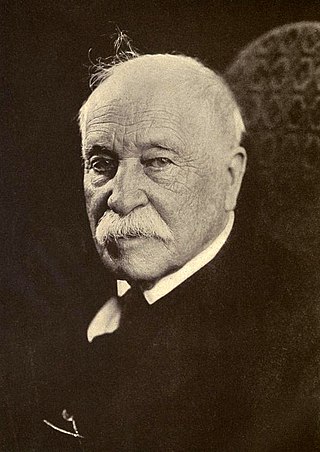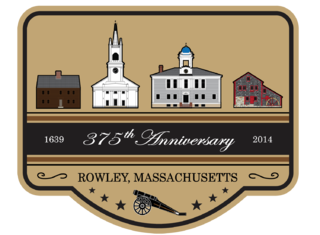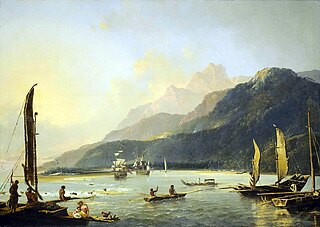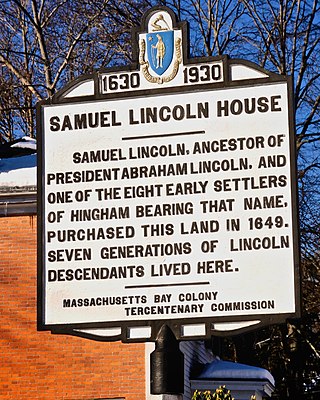
William Dean Howells was an American realist novelist, literary critic, and playwright, nicknamed "The Dean of American Letters". He was particularly known for his tenure as editor of The Atlantic Monthly, as well as for his own prolific writings, including the Christmas story "Christmas Every Day" and the novels The Rise of Silas Lapham and A Traveler from Altruria.
This article contains information about the literary events and publications of 1638.

Rowley is a town in Essex County, Massachusetts, United States. The population was 6,161 at the 2020 census.

Richard Henry Dana Jr. was an American lawyer and politician from Massachusetts, a descendant of a colonial family, who gained renown as the author of the classic American memoir Two Years Before the Mast. Both as a writer and as a lawyer, he was a champion of the downtrodden, from seamen to fugitive slaves and freedmen.

Gideon Welles, nicknamed "Father Neptune", was the United States Secretary of the Navy from 1861 to 1869, a cabinet post he was awarded after supporting Abraham Lincoln in the 1860 election. Although opposed to the Union blockade of Southern ports, he duly carried out his part of the Anaconda Plan, largely sealing off the Confederate coastline and preventing the exchange of cotton for war supplies. This is viewed as a major cause of Union victory in the Civil War, and his achievement in expanding the Navy almost tenfold was widely praised. Welles was also instrumental in the Navy's creation of the Medal of Honor.

Woodes Rogers was an English sea captain, privateer, slave trader and, from 1718, the first Royal Governor of the Bahamas. He is known as the captain of the vessel that rescued marooned Alexander Selkirk, whose plight is generally believed to have inspired Daniel Defoe's Robinson Crusoe.

HMS Adventure was a barque that the Royal Navy purchased in 1771. She had been the merchant vessel Marquis of Rockingham, launched in 1770 at Whitby. In naval service she sailed with Resolution on James Cook's second expedition to the Pacific in 1772–1775. She was the first ship to circumnavigate the globe from west to east. After her return she served as a store ship until 1779. The navy sold her in 1783 and she resumed a civilian career, but retaining the name Adventure. She was lost in May 1811.

Rowley is a small village and civil parish in the East Riding of Yorkshire, England. It is situated 1 mile (1.6 km) south of Little Weighton and approximately 6 miles (9.7 km) south-west of Beverley town centre.

HMS Rose was a 20-gun (Seaford-class) sixth-rate post ship of the Royal Navy, built at Blaydes Yard in Hull, England in 1757. Her activities in suppressing smuggling in the colony of Rhode Island provoked the formation of what became the Continental Navy, precursor of the modern United States Navy. She was based at the North American station in the West Indies and then used in the American Revolutionary War. She was scuttled in the harbour of Savannah, Georgia in 1779. A replica was built in 1970, then modified to match HMS Surprise, and used in two films, Master and Commander: Far Side of the World and Pirates of the Caribbean: On Stranger Tides.

The Old Ship Church is a Puritan church built in 1681 in Hingham, Massachusetts. It is the only surviving 17th-century Puritan meetinghouse in America. Its congregation, gathered in 1635 and officially known as First Parish in Hingham, occupies the oldest church building in continuous ecclesiastical use in the United States. On October 9, 1960, it was designated a National Historic Landmark and on November 15, 1966, it was added to the National Register of Historic Places.
Ezekiel Rogers was an English nonconformist clergyman, and Puritan settler of Massachusetts.

Samuel Lincoln was an Englishman and progenitor of many notable United States political figures, including his 4th-great-grandson, President Abraham Lincoln, Maine governor Enoch Lincoln, and Levi Lincoln Sr. and Levi Lincoln Jr., both of whom served as Massachusetts Representatives, Governor and Lieutenant Governor. Because of Samuel Lincoln's descendants, his fortuitous arrival in the Massachusetts Bay Colony, and the fact that his ancestry is known for several generations, he is considered the father of the most prominent branch of Lincolns in the United States.

Ticknor and Fields was an American publishing company based in Boston, Massachusetts. Founded as a bookstore in 1832, the business would publish many 19th century American authors including Ralph Waldo Emerson, Nathaniel Hawthorne, Henry James, Henry Wadsworth Longfellow, Harriet Beecher Stowe, Henry David Thoreau, and Mark Twain. It also became an early publisher of The Atlantic Monthly and North American Review.

Northern Light was an American clipper ship. In 1853 she sailed from San Francisco, California to Boston, Massachusetts via Cape Horn with Captain Freeman Hatch at the helm in a record-setting 76 days, 6 hours. The record still stands for a single hull vessel. In 1993 the record was soundly broken by a multi-hull sailing vessel Great American II with no cargo. Sailing around Cape Horn is widely regarded as one of the most challenging routes in yachting, due to extreme weather, strong currents, and a historical reputation for mountainous seas and frequent severe storms.
Liberty was a sloop owned by John Hancock, an American merchant, whose seizure was the subject of the Liberty Affair. Seized by customs officials in Boston in 1768, it was commissioned into the Royal Navy as HMS Liberty, and she was burned the next year by American colonists in Newport, Rhode Island in one of the first acts of open defiance against the British crown by American colonists.
SS Vesta was a propeller-driven fishing vessel 250 gross tons, built in 1853 at Nantes, France, by Hernoux et Cie of Dieppe for the Société Terreneuvienne of Granville in Normandy. The company had extensive fishing interests in the Grand Banks area off Newfoundland, which it operated from a base in Saint Pierre Island. On 27 September 1854 Vesta was eastbound with a crew of 50, returning 147 fisherman and salters home. In a heavy fog, Vesta collided with the Collins Line passenger paddle steamer SS Arctic. A three-metre (ten-foot) section of Vesta's bow was sheared off, but the watertight bulkhead behind the bow remained intact and kept out the sea, keeping the vessel afloat.

The Samuel Eliot Morison bibliography contains a list of books and articles written by American historian Samuel Eliot Morison.
Paul Brooks (1909–1998) was a nature writer, book editor, and environmentalist.
Elizabeth Glover was responsible for bringing the first printing press to the Thirteen Colonies. She established a press in Cambridge, Massachusetts, where she printed Oath of a Freeman, An Almenack, and the Bay Psalm Book with the help of printer Stephen Daye. She married Henry Dunster, first president of Harvard University. After Glover's death, the printing press was gifted to Harvard, thus beginning the Harvard University Press.
Joseph Glover, typically referred to as Jose or Josse, was an English nonconformist minister, noted for being a pioneer of printing in the English colonies of North America and one of the people instrumental in establishing Harvard College.












